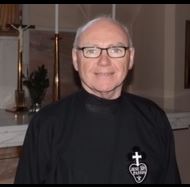The Week of Prayer for Christian Unity, just gone, brought to mind an experience I had twenty years ago, when I was parish priest of St. Gabriel’s in Prestonpans. Over the years the relations between the different Christian denominations in this Reformation heartland had been strained. There used to be a pub called Billy’s Bar opposite St. Gabriel’s and it was not uncommon for the church to be the victim of petty vandalism at closing time on a Friday or a Saturday night. I’m told that the late Father Aloysius CP once tried to defuse the situation by going over one evening to Billy’s Bar and leading the revellers in a rendition of The Sash My Father Wore. His gesture went down well.
By the time I went to Prestonpans, Billy’s Bar had gone and relations between the faiths were much improved. During Christian Unity Week in 1997, the local Church of Scotland Minister and myself decided to do a pulpit exchange, with him coming to preach at our 9.00am Mass and me going to preach at his 11.00am Service. Everything went well at St. Gabriel’s. The minister included in his sermon a very powerful appreciation of St. Maximilian Kolbe, the Franciscan Friar who volunteered to die in the death camp at Auschwitz in place of another man who had a wife and family.
I was very interested in this as I had actually been at the canonisation of Maximilian Kolbe in 1982, while I was studying at the Gregorian University in Rome. The night before the canonisation I was at a press conference with the man whom Kolbe had sacrificed his life for, Franciszek Gajowniczek. He was at the canonisation as a personal guest of Pope John Paul ll. He said that so long as he had breath in his lungs, he would consider it his duty to tell people about the heroic act of love by Maximilian Kolbe, and he was true to that until he died in 1995, a full 53 years after his life had been spared. A sad memory of that day was that, on my way to the Vatican, I met a young Scottish Franciscan nun at the bus stop. She had been professed as Sister Maximilian, after Kolbe, and she was very excited about attending the event. She was a lovely person, but a short time later she was killed in a road accident in Africa after leaving her parents to the airport. I visited her grave in the Missionaries Cemetery in Nairobi in 1994, the same cemetery where the Venerable Edel Quinn is buried.
But getting back to that pulpit exchange. As I said, the minister was very well received by our congregation in St. Gabriel’s, and then it was my turn. The people at Prestongrange Church of Scotland welcomed me warmly but, as I got up to read the Gospel and preach, two burly men came out of their seats and stood in front of me. For quite a while they just stared at me, and then they turned and marched out of the church. It occurred to me in that moment that I had just been “protested” against. I was urged to continue, which I did, and afterwards the apologies were profuse. Apparently these two characters, while known to many, rarely set foot inside the church, and had come specifically that day to make their protest. I think all they did was embarrass themselves. The rest of us had a cup of tea together afterwards and, all in all, the exchange had been a great success.
I had a different kind of protest experience with another minister, the wonderfully vibrant lady minister at Wallyford, who would have made the Vicar of Dibley seem dull. In Wallyford, which was part of the Parish of St. Gabriel’s, the Oratory of St. James’s, where I celebrated Mass once a week, was right beside the minister’s house; in fact, the catholic lady who looked after the oratory was also the housekeeper for the minister and her husband, and I was often invited in for a drink and a chat. Now, the people of Wallyford had a concern about traffic coming off the A1 and speeding through the village with obvious danger to pedestrians, especially children. Appeals for traffic calming measures had so far fallen on deaf ears and so the pair of us joined the people of Wallyford in a stand-up protest in the middle of the road, risking life and limb, until their voices were heard. So, if ever you drive through Wallyford and curse the traffic calmers, I’m partly to blame.
Here is one of St. Maximilian Kolbe’s most powerful sayings:
No one in the world can change Truth. What we can do and should do is to seek truth and to serve it when we have found it. The real conflict is the inner conflict. Beyond armies of occupation and the hecatombs [e.g. the sacrifice of many victims] of extermination camps, there are two irreconcilable enemies in the depth of every soul: good and evil, sin and love. And what use are the victories on the battlefield if we ourselves are defeated in our innermost personal selves?

 RSS Feed
RSS Feed
